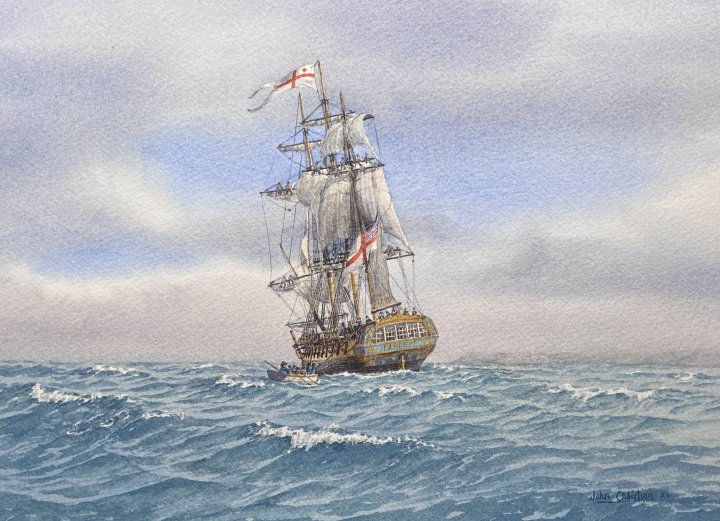
At the end of January 1797, Nelson, his Commodore’s broad pennant on board Minerva, left Elba.
Nelson reached Gibraltar on February 9 and picked up Lieutenants Hardy and Culverhouse. Nelson weighed anchor and set off for the Atlantic to join Sir John Jervis and the fleet. Two Spanish Ships of the line were watching Gibraltar from Algeciras Bay and gave chase seeing an easy prey in a small frigate. Colonel John Drinkwater was a guest aboard Minerva and asked Nelson if there was likelihood of engagement, Nelson replied “Before the Dons get hold of that bit of bunting aloft, I will give them a struggle, and sooner than give up this frigate I’ll run her aground.” Shortly after, while dining at the Commodore’s table, came the call “Man overboard!” few sailors could swim, but the codes that governed life at sea meant an attempt to rescue was required. The officers ran on deck, within seconds, Lieutenant Hardy with a party of sailors were lowering the jolly-boat. The strong currents in the straits had carried it astern of the frigate towards the Spanish ships. Hardy signalled the man-overboard was lost and was now in a perilous situation. The Jolly-boat rowers pulled hard but could not regain the frigate. At this crisis Nelson exclaimed “My God, I’ll not lose Hardy!”. "Back the mizzen mainsail" was his first command, no sooner done than the Minerva's progress was retarded and this allowed the current to carry her down to Hardy on the jolly-boat. The pursuing Spanish ships misread the situation and thought Nelson was in touch with the fleet and dropping back to draw them into a trap – they shortened sail and slowed to a distance. Nelson picked up Hardy and the jolly-boat, put out more sail and lost the pursuers.
For more information visit https://www.johnchristian-seapictures.com/water-colours---georgian-navy.html
Image Location
Telephone: 01803 525 373
Email: johnmail197@gmail.com
Website: https://www.johnchristian-seapictures.com/water-colours---georgian-navy.html

